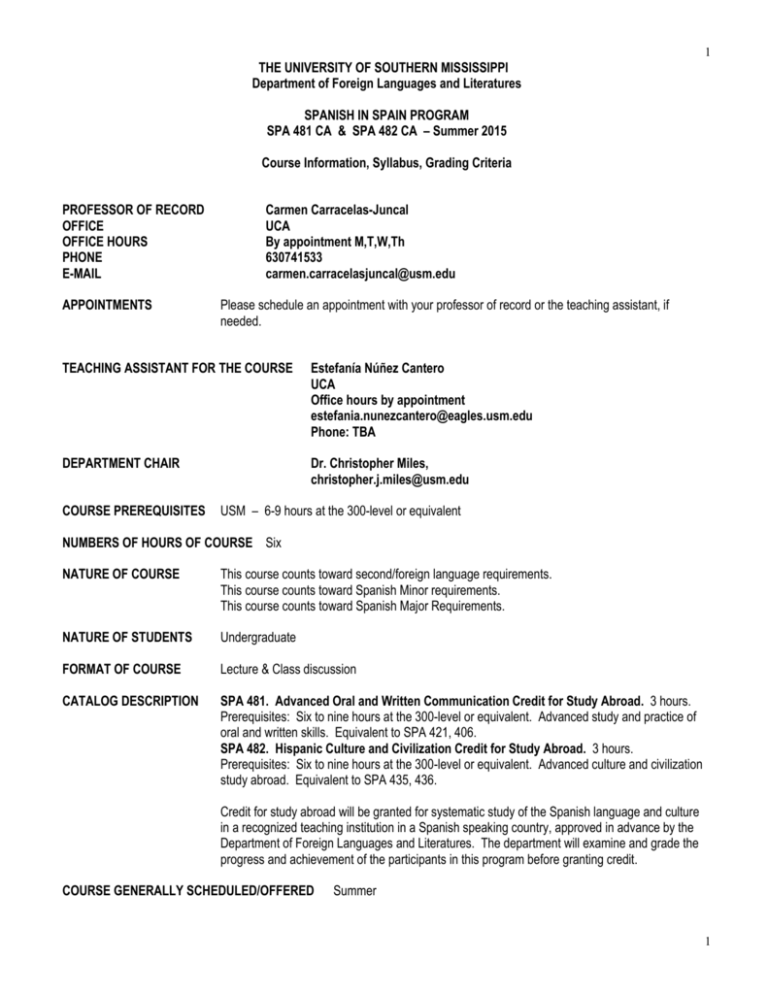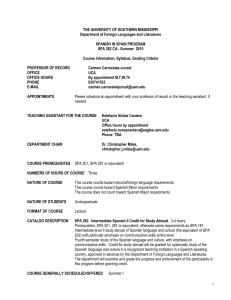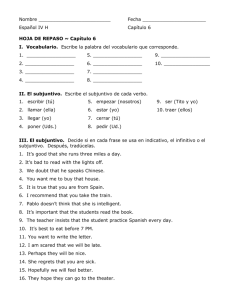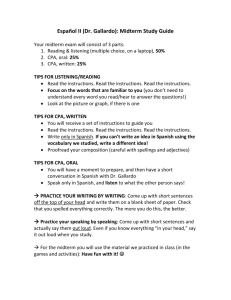spa_481_spa_482_course_description_and_syllabus_2015
advertisement

1 THE UNIVERSITY OF SOUTHERN MISSISSIPPI Department of Foreign Languages and Literatures SPANISH IN SPAIN PROGRAM SPA 481 CA & SPA 482 CA – Summer 2015 Course Information, Syllabus, Grading Criteria PROFESSOR OF RECORD OFFICE OFFICE HOURS PHONE E-MAIL APPOINTMENTS Carmen Carracelas-Juncal UCA By appointment M,T,W,Th 630741533 carmen.carracelasjuncal@usm.edu Please schedule an appointment with your professor of record or the teaching assistant, if needed. TEACHING ASSISTANT FOR THE COURSE Estefanía Núñez Cantero UCA Office hours by appointment estefania.nunezcantero@eagles.usm.edu Phone: TBA DEPARTMENT CHAIR Dr. Christopher Miles, christopher.j.miles@usm.edu COURSE PREREQUISITES USM – 6-9 hours at the 300-level or equivalent NUMBERS OF HOURS OF COURSE Six NATURE OF COURSE This course counts toward second/foreign language requirements. This course counts toward Spanish Minor requirements. This course counts toward Spanish Major Requirements. NATURE OF STUDENTS Undergraduate FORMAT OF COURSE Lecture & Class discussion CATALOG DESCRIPTION SPA 481. Advanced Oral and Written Communication Credit for Study Abroad. 3 hours. Prerequisites: Six to nine hours at the 300-level or equivalent. Advanced study and practice of oral and written skills. Equivalent to SPA 421, 406. SPA 482. Hispanic Culture and Civilization Credit for Study Abroad. 3 hours. Prerequisites: Six to nine hours at the 300-level or equivalent. Advanced culture and civilization study abroad. Equivalent to SPA 435, 436. Credit for study abroad will be granted for systematic study of the Spanish language and culture in a recognized teaching institution in a Spanish speaking country, approved in advance by the Department of Foreign Languages and Literatures. The department will examine and grade the progress and achievement of the participants in this program before granting credit. COURSE GENERALLY SCHEDULED/OFFERED Summer 1 2 COURSE GOALS The main goal of this course is to hone listening and oral skills beyond the conversational skills gained in the first three years of study of the language. This course will provide students the necessary syntactic background that will allow them to develop their writing and speaking skills. Students will be given the opportunity to learn by doing and to practice their written and oral skills on specific topics under the guidance of a skilled instructor. COURSE OBJECTIVES The main focus and goal of this course is “Composición”, i.e., learning how to write well in Spanish. The secondary focus of this class is “Gramática”; to write well in any language, one must have a good grasp of its grammar, complex grammatical structures, vocabulary, language construction and idioms/expressions. By working in groups, participating in class discussions, asking and answering questions, and making oral presentations, student will develop communicative oral and written skills necessary to perform numerous communicative tasks in Spanish. The course aims at facilitating students to: communicate at an intermediate-advanced level in real daily life occurrences understand and interpret written and spoken language on a variety of topics discuss certain topics pertinent to life in the city present information, and ideas to an audience of listeners or readers on a variety of topics use proper vocabulary in context as needed to communicate in real life situations understand oral and written news on current topics discuss pertinent cultural information read aloud in front of the class make oral presentations on specific topics improve pronunciation demonstrate understanding of the nature of language through comparisons of the Spanish and English languages. TEACHING TECHNIQUES / METHODS USED IN COURSE The course takes a communicative approach to the learning of the Spanish language. The course implements pair work, small group work, class circulation, information gap, and task-based and other activities to engage students in communicative oral and written exchanges such as providing and obtaining information and exchanging opinions. The written assignments and “composiciones” will follow a process in which correct use of grammar is essential. Use more sophisticated vocabulary, idioms and expressions. Learn and practice composition techniques by examining short essays and stories to examine structures and, in that manner, improve our own writing. Follow a certain process for organizing ideas which we can then develop in writing. This process will be based on written compositions and other assignments which will be presented at certain dates, will be “corrected” by the instructor (who will point out the mistakes and the class of mistake) A self-correction and re-writing of the composition we will have a better compositions or end products. LABORATORY REQUIREMENTS Because this course takes place in Spain, students are required to have continuous outside-of-class interaction communicating with the Spanish family they live, accessing transportation in the city, requesting every noon meals at local restaurants, shopping, etc. and using written materials, such as newspaper articles, ads, and other realia, etc. 2 3 COURSE REQUIREMENTS Requirements Attendance and Participation Due Daily Points / Grading Specifics 20% Any student who is absent for more than four (4) hours will have his/her final course grade lowered by two percentage points per hour absent. Attendance will be taken daily. Extracurricular activities are not grounds for exemption from attendance and participation policies except as pre-arranged with instructor. Journal Writing 20% You will need to keep a reflective journal about your language learning and culture learning experiences while in Spain. The journal can be written both in English and Spanish, including more Spanish as the weeks progress. See instructions below In-Class Presentation 20% The last week of class, you will give a short 5-10minute presentation about one of the topics highlighted in your journal entries. You can be as creative with your presentation as you wish. Homework Assignments Daily, as specified in the course syllabus or by the instructor in class. Late submission is not accepted 20% Homework is any out-of-class activity assigned by the instructor. Final Examination The final examination cannot be waived or made up. It will take place on the last week of class. 20% The final examination is a comprehensive examination covering the skills and material acquired in this course. 3 4 JOURNAL ENTRIES: Topics and Timeline (to be submitted to Dr. Carracelas-Juncal) You can write the journal entries in Spanish with some English when needed. Include a list of 5-10 new words or expressions that you have learned as part of each weekly entry. First entry due: Monday May 18th You should write your first entry upon arrival in Spain or on the following day. Please include the date on your entry. Topic: Your reactions to your arrival in Spain and your first impressions of your new surroundings. Also include your goals for the program. For the next four entries you should write about your learning progress during the first week. Describe the strategies you use in order to learn the language. Comment on the culture of your new environment, compare and contrast what you see with your own culture. Include any experience you might have had during the week, how you are feeling, what you are doing with the language, whether you are integrating yourself in the culture, etc. Second entry due: Monday, May 25th You should write this entry by the end of the first week in Spain. Please include the date. Third entry due: Monday, June 1st You should complete this entry by the end of the second week in Spain. Please include the date. Fourth entry due: Monday, June 8th You should complete this entry by the end of your third week in Spain. Please include the date. Fifth entry due: Monday, June 15th You should complete this entry by the end of your fourth week in Spain. Please include the date. Last entry due: Monday, June 20th You should write your last entry two or three days before your departure to the USA. Please include the date. Topic: Evaluate your experience in Spain. Evaluate your initial goals and whether you accomplished them. Include a final reflection of your 5 weeks in Spain and whether the experience has changed you in any way. You can include a self-evaluation of your skills, how you are feeling, etc. GRADING SCALE/CRITERIA/POINTS FOR EACH ASSESSMENT USED In Class Contributions and Collaboration Class contributions and collaboration will be evaluated as following: 0: never 1-2: less than half of the time and needs a lot of assistance 3-4: less than half of the time and usually needs assistance RUBRICS / CRITERIA PREPARATION Brings all materials and assigned work to class every day; has read/studied all assigned pages before coming to class. LANGUAGE Speaks only in Spanish during the class, regardless of accuracy. EFFORT / SKILL Demonstrates high effort to apply new vocabulary and skills, self-corrects, applies skills learned in previous lessons with high accuracy. PARTICIPATION Volunteers often and participates fully in whole-class discussion. Scale 5-6: about half the time and often needs assistance 7-8: almost all the time, but usually needs assistance 9-10: most of the time, and needs very little assistance 0 1 2 3 4 5 6 7 8 9 10 4 5 GROUP WORK Works well in groups and pairs—speaks in Spanish and stays on task TOTAL POINTS _______X 2_/ 100 Oral Presentation You are required to prepare and give an oral presentation. Clarity of Information Vocabulary Preparation Organization Presentation Style (natural speech, not read) Effectiveness of Topic Grammar Structures Use of Visuals Inclusion of Examples Use of Time / Respect of Time Limit Exemplary Good Acceptable Lacking Not Acceptable 10-9 10-9 10-9 10-9 10-9 8 8 8 8 8 7 6 7 7 7 6 6 6 6 6 0-5 0-5 0-5 0-5 0-5 10-9 10-9 10-9 10-9 10-9 8 8 8 8 8 7 7 7 7 7 6 6 6 6 6 0-5 0-5 0-5 0-5 0-5 SCORE TOTAL POINTS _____ / 100 Journal entries You are required to prepare and submit 6 journal entries to your professor of record on the dates specified in the timeline. RUBRICS / CRITERIA Exemplary Good Acceptable Lacking Appropriate Details 20 18 16 14 Not Accept able 0-12 Content Relevant and in accordance to task Organization Logical ordering of information Use of Vocabulary Integration of new and varied vocabulary and expressions Grammatical Accuracy and Mechanics Application of newly acquired grammatical concepts; varied sentence structure; orthography; use of accentuation and punctuation Reflection and Creativity Evidence of critical thinking, reflective writing, and creativity Length One to two pages per entry 20 18 16 14 0-12 20 18 16 14 0-12 15 13 11 9 0-7 15 13 11 9 0-7 10 8 6 4 0-3 If your work does not meet length requirements, your total score may be severely lowered. TOTAL POINTS _____ / 100 5 6 Homework Assignments Homework is evaluated on completion. Late submissions are not accepted. Homework will be evaluated as following: Exemplary Good Acceptable Lacking Not Acceptable 40 30 20 10 0 Week 2 (4 days) Homework Teacher’s Comments: 40 30 20 10 0 Week 3 (2 days) Homework Teacher’s Comments: 20 15 10 5 0 SCORE Week 1 (5 days) Homework Teacher’s Comments: TOTAL POINTS _____ Final Comprehensive Exam Final Comprehensive Exam is evaluated based on percentage of linguistic / communicative accuracy and appropriateness on a scale of 0-100%. The Final Exam will assess the following components: Listening Comprehension 20% Oral Expression 20% Reading Comprehension 20% Written Expression 20% Grammatical Structure 20% FINAL GRADE A B C D F 90-100% 80-89% 70-79% 60-69% 0-59% DISABILITY STATEMENT Students with disabilities requiring assistance, and who qualify under Section 504 and/or the American with Disabilities Act (ADA), she should contact the Coordinator for Office for Disability Accommodations (ODA) for information on appropriate policies and procedures. Disabilities covered by ADA may include learning, psychiatric, physical impairments, or chronic health disorders. Students should contact ODA if they are not certain whether a medical condition/disability qualifies. Box 8568; Telephone (601) 266-5024; TTY (601) 266-6837; Fax (601) 266-6035. PLAGIARISM Students are expected to adhere to the highest standard of academic honesty outlined in the USM Student Handbook. Any information that is copied from another source must be noted as such in student materials. Page numbers or Internet reference must appear in the text and full bibliographic references must appear in the reference section of the paper/assignment. Sources must be in quotes and include author(s), year of publication or other reference notes as required by the college department format (e.g. MLA, APA or Chicago styles). Other forms of academic dishonesty include, but are not limited to, buying papers, copying paragraphs/pages of text/whole papers off the Internet, copying another student’s answers, etc. Academic dishonesty will result in the grade of a “0” on the assignment and/or in the course and/or the student may be reported to the Vice President for Academic Affairs for further action. 6 7 THE UNIVERSITY OF SOUTHERN MISSISSIPPI Department of Foreign Languages and Literatures Spanish in Spain Program SPA 481 & SPA 482 SYLLABUS –– Summer 2015 GENERAL EVALUATION RUBRICS Homework 20% Participation 20% Oral Presentation 20% Journal and Presentation Final Exam Contenidos Funcionales Informar sobre algo con mayor o menor implicación Introducir un elemento nuevo en el discurso Relacionar una información con algo dicho anteriormente: oposiciones y contrastes. Reaccionar ante informaciones nuevas referidas a conocimientos anteriores. Tratar de convencer a alguien de la veracidad de nuestras palabras Poner ejemplos en el discurso. Referirse a la información que ha dicho otra persona o uno mismo Seleccionar información para resumir Cambiar de tema Hacer un inciso Recordar algo a alguien Describir a personas con expresiones coloquiales que contienen nombres de animales Describir objetos en situaciones específicas Mostrar acuerdo o desacuerdo: disconformidad Expresar opiniones y enlazar ideas Reaccionar ante la insatisfacción y/o pena ajena Manifestar estados físicos y estados de ánimo Expresar miedo y preocupación Tranquilizar, consolar, animar a alguien Lamentarse de algo Hablar de manías Hablar de algo que no queremos o no podemos nombrar Expresar probabilidad e hipótesis Referirse a hechos que presentamos como irreales porque dependen de condiciones que según nosotros no se han cumplido Expresar prohibiciones Conceder permiso con reserva Expresar extrañeza o asombro Expresar desinterés y aburrimiento Expresar lástima Expresar esperanza y deseos La expresión de la impersonalidad y la indeterminación Quitar importancia a algo Reclamar o protestar Pedir recomendación. Recomendar Hacer cumplidos y reaccionar ante ellos 20% 20% Contenidos Gramaticales Pronunciación Entonación: reticiencia, retintín, insinuación, etc. División silábica Normas de ortografía: Acento ortográfico y puntuación Abreviaturas y siglas Sustantivos y géneros: prefijos y sufijos Formación del número: casos especiales El pronombre “lo” en las frases proposicionales Lo + adjetivo Determinantes indefinidos. Uso de uno/a La comparación: más/ menos de, cuánto más/menos, ... La involuntariedad: uso de “se” Pronombres y adjetivos relativos Las preposiciones: usos específicos de para y por Construcciones pasivas Contraste de oraciones impersonales/ pasiva refleja Locuciones adverbiales Estilo indirecto referido al presente, pasado y futuro. Verbos que lo introducen Contraste de ser/ estar. Usos especiales Tiempos de Indicativo que se refieren al presente/pasado/futuro Pretérito Pluscuamperfecto de Indicativo Pretérito Anterior Recursos y expresiones para convencer Recursos para informar con mayor o menor implicación: Parece ser que..., resulta que..., así que... Contraste Indicativo/Subjuntivo en la expresión de la condición, de la suposición Otros valores de “se” Usos preposicionales en expresiones de tiempo Futuro Perfecto de Indicativo 7 8 Presente de Subjuntivo Pretérito Perfecto de Subjuntivo Pretérito Imperfecto de Subjuntivo Pretérito Pluscuamperfecto de Subjuntivo Condicional simple y compuesto Oraciones subordinadas + Indicativo/Subjuntivo Sustantivas (Indicativo/Subjuntivo) Adverbiales , introducidas por conjunciones / locuciones(Indicativo/Subjuntivo): Causales Concesivas Finales Condicionales Modales Consecutivas Temporales Adjetivas (introducidas por pronombres relativos) Perífrasis Verbales Contenidos Culturales (No todos los temas culturales serán discutidos durante las cinco semanas del curso) Contenidos Léxicos (Serán asignados por el profesor según los temas escogidos) La familia española Nombres y apellidos en España Reuniones y acontecimientos familiares Relaciones sociales: el saludo formal La vida cotidiana Documentos de identificación personal El transporte público El mundo del espectáculo: cine, teatro, etc. Fiestas y tradiciones populares La vida cotidiana La compras en España La gastronomía El clima y el paisaje en España Los jóvenes españoles El mundo del deporte español El folklore en España: bailes y trajes regionales Los medios de comunicación: prensa, radio, TV La vivienda: casa típicas en España El regateo y la propina Las supersticiones en España La influencia de la religión Católica en los españoles 8 9 La vivienda: casa típicas en España El regateo y la propina Las supersticiones en España Los juegos de azar La vivienda: casa típicas en España El regateo y la propina La comunicación no verbal: el lenguaje de los gestos Las supersticiones en España El medioambiente en España El Código de Circulación: respeto de las normas de tráfico El Sistema educativo Español El Sistema monetario Pesos y medidas La burocracia El mundo laboral La Seguridad Social: seguros médicos La vida política en España: sistema y organización Las Comunidades autónomas de España La monarquía española España y la Unión Europea El mundo de la publicidad y el sensacionalismo España e Hispanoamérica: ayer y hoy SPA 481 Presentación (TBA) Examen Final (TBA) SPA 482 Presentación (TBA) Examen Final (TBA) 9







